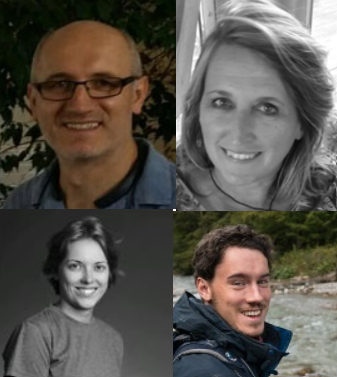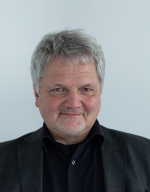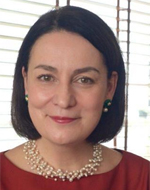COMMITTEES
The organisational structure of HR21, including stringent guidelines, procedures and clear responsibilities, guarantees the success of HR21. All activities of the different committees are supported by the DocService, ensuring professional assistance and execution.
Management Board
The management board (MB) functions as the overall management unit of HR21, leading the overall academic, administrative and financial management and has the full responsibility for the achievement of the defined quality standards in both teaching and research. The management board develops strategies to allocate external funding and is in charge of organising the implementation of the strategies and its measures. The management board serves as a strategic body with the aim to identify scientific topics relevant for future developments of HR21. It is responsible for approval of selected HR21 PhD students and all reporting activities. The MB has seven members, namely the HR21 speaker and deputy speaker, the student speaker and the student deputy speaker and three additional faculty members.

Faculty Members:
Hauer Christoph
Hein Thomas
Schinegger Rafaela
Schmid Martin
Stöglehner Gernot
Stumpp Christine
Student Members:
Dittrich Anna-Lisa
Basooma Anthony
Curriculum committee
The curriculum committee has advisory functions to the management board in all aspects of the curriculum and is in charge of the academic quality assurance, the curriculum development and adaptations of the curriculum. The curriculum committee consists of 4 members, two members of the faculty and two members of the student assembly. The educational program is evaluated at a regular basis via online evaluation forms to monitor the achievement of targeted learning outcomes and several other key-performance indicators. In addition, regular student feed-back workshops are held to guarantee the concerted input of student views.

Faculty Members:
Weigelhofer Gabriele
Schmid Erwin
Seher Walter
Student Members:
Bauer Katharina
Gcakasi Monis Nolitha
Ombuds Committee
The Ombuds committee consists of four members: one male and one female faculty member and one male and female student member. In case of serious problems and conflicts between students and supervisors (all aspects of mobbing, gender- and minority-related offences and discriminations, or suspicion of violating the rules of Good Scientific Practice) each member has the right to bring the problem to the notice of the committee, which is recommending further procedures/action-points to the management board.

Faculty Members:
Ertl Thomas
Hood-Nowotny Rebecca
Student Members:
Karlsson Faudot Elise
Auhser Alexander
Scientific advisory board

Rainer Danielzyk is a full professor and head of the Spatial Planning and Regional Development Working Group at the Institute for Environmental Planning at Leibniz University Hannover. Previously, he was managing director of the ARL Academy for Territorial Development in the Leibniz Association in Hannover for eleven years and scientific director of the ILS Institute for Regional and Urban Development Research in Dortmund for twelve years. His research focuses on spatial planning and territorial development, theory and empiricism in regional development, and planning theory. He is extensively involved in advising politics and planning practice, e.g. having served as chairman of the Advisory Board for Spatial Development of the German Ministry of Construction for ten years.
Further information

M. Teresa FERREIRA is Professor at the Department of Natural Resources, Environment and Landscape at the University of Lisbon. She has a biologist background, a post-graduation on Freshwater Ecology, and a PhD and Habilitation in Forest Engineering and Natural Resources Management. She works on freshwater ecology and management, with special interest on ecological quality, fish community ecology, fish habitat requirements and riparian ecology. She is responsible for a MSc in Management and Conservation of Natural Resources and a PhD on River Restoration and Management. Teresa developed research activities in 56 national and European competitive projects, and was involved in an identical number of applied studies (ecohydraulics, ecological monitoring, fisheries, river restoration). She published over 200 peer-reviewed papers and presented over 400 oral communications. Teresa acts as administration advisor for water management affairs and is a member of the National Water Council and of the Science Council for the Portuguese National Science Foundation.
Further information

Courtney Flint is a Professor of Environment & Society at Utah State University in Logan, Utah. Her research focuses on changing landscapes, water systems, and community conditions and associated vulnerabilities and interactions in diverse governance arrangements. Current projects involve mapping social, ecological, and technological vulnerabilities downstream of dams in Utah, investigating the role and perspectives of local water and emergency management organizations in regional water hazard mitigation, and assessing alignments and misalignments in water data management across Utah water-related agencies. She also directs the Utah Wellbeing Project which is a partnership with leaders of cities and towns to survey local residents on an array of topics related to local wellbeing and to support local and state planning efforts. Dr. Flint and her students use mixed methods approaches and working closely with engineers, physical and natural scientists, and multi-scale leaders and practitioners.
Further information

Nicolas LAMOUROUX is Research Director at INRAE, The National Research Institute for Agriculture, Food and Environment in France. He leads the RiverLy research unit in Lyon, an interdisciplinary group working on hydrosystem functioning. He also leads the Rhône River Catchment Long Term Socio-Ecological Research (LTSER) observatory, which involves 20 research units working on transdisciplinary freshwater issues. He is ecohydrologist and has developed original statistical approaches of river hydraulics and habitats. He develops, tests and transfers models that are used for defining ecological flows and restoration strategies, at both local and large scales.
Further information

Birgit VOGEL is the Executive Secretary of the ICPDR (International Comimission for the Protection of the Danube River - icpdr.org). The International Commission for the Protection of the Danube River (ICPDR) works to ensure the sustainable and equitable use of waters in the Danube River Basin. The work of the ICPDR is based on the Danube River Protection Convention (DRPC), the major legal instrument for cooperation and transboundary water management in the Danube River Basin. The ICPDR addresses the entire Danube River basin, comprising 19 countries, making it the most international river basin in the world. Including more than 300 tributaries and connected groundwater resources too, this makes the ICPDR one of the largest and most active international river basin management commissions in the world.
Further information
